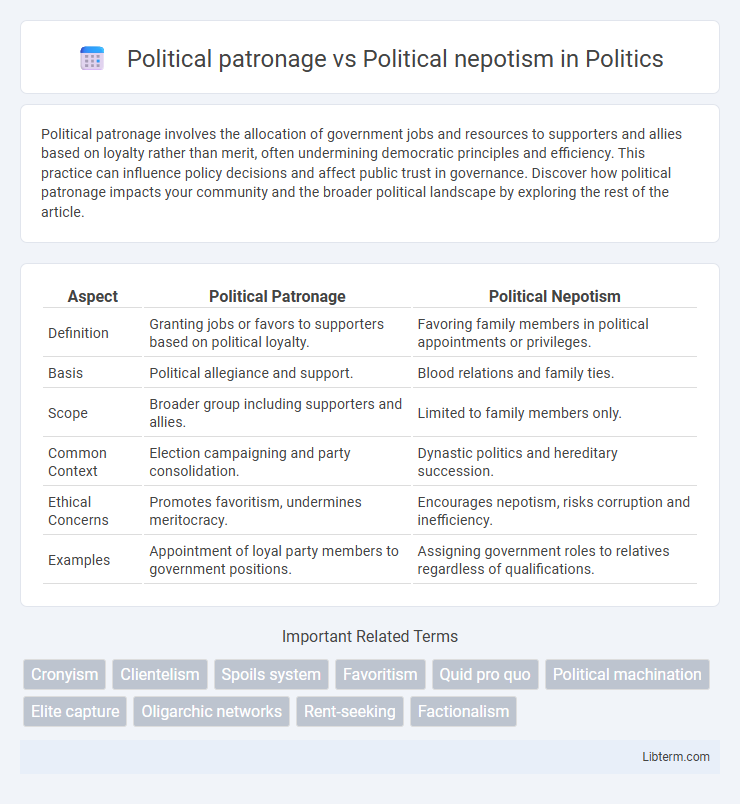Political patronage involves the allocation of government jobs and resources to supporters and allies based on loyalty rather than merit, often undermining democratic principles and efficiency. This practice can influence policy decisions and affect public trust in governance. Discover how political patronage impacts your community and the broader political landscape by exploring the rest of the article.
Table of Comparison
| Aspect | Political Patronage | Political Nepotism |
|---|---|---|
| Definition | Granting jobs or favors to supporters based on political loyalty. | Favoring family members in political appointments or privileges. |
| Basis | Political allegiance and support. | Blood relations and family ties. |
| Scope | Broader group including supporters and allies. | Limited to family members only. |
| Common Context | Election campaigning and party consolidation. | Dynastic politics and hereditary succession. |
| Ethical Concerns | Promotes favoritism, undermines meritocracy. | Encourages nepotism, risks corruption and inefficiency. |
| Examples | Appointment of loyal party members to government positions. | Assigning government roles to relatives regardless of qualifications. |
Understanding Political Patronage: Definition and Origins
Political patronage involves the appointment of individuals to government positions based on loyalty and support rather than merit, aiming to consolidate political power and reward allies. Its origins trace back to ancient civilizations where rulers granted favors to supporters to maintain authority and control over resources. This practice fosters networks of influence but often raises concerns about efficiency and corruption in governance.
Defining Political Nepotism: Meaning and Historical Context
Political nepotism refers to the practice of favoring relatives or close family members in political appointments, often bypassing merit-based criteria. Historically, this phenomenon has roots in monarchies and aristocratic systems where power was consolidated within family lines, influencing modern political structures worldwide. Understanding political nepotism involves examining its impact on governance, transparency, and the perpetuation of elite dominance within political institutions.
Key Differences Between Patronage and Nepotism
Political patronage involves appointing individuals to government positions based on loyalty, support, or political connections, often extending beyond family ties, whereas political nepotism specifically favors relatives regardless of merit. Patronage serves as a strategic tool for consolidating power within broader political networks, while nepotism typically prioritizes blood relations, potentially undermining institutional meritocracy. The key difference lies in the scope of favoritism: patronage is broader and politically motivated, whereas nepotism is narrowly centered on family-based preferential treatment.
Political Patronage Systems in Modern Governance
Political patronage systems in modern governance involve the strategic allocation of government jobs, contracts, and favors to loyal supporters or party members to maintain political dominance and ensure policy alignment. These systems often influence public resource distribution and administrative efficiency, raising concerns about meritocracy and corruption while reinforcing party loyalty and electoral support. Understanding the dynamics of political patronage is essential for analyzing governance challenges and the balance between political strategy and institutional integrity.
Real-World Examples of Political Nepotism
Political nepotism involves favoritism granted to relatives or close family members in government positions, a practice prevalent in countries like the Philippines, where President Rodrigo Duterte appointed family members to key roles, and in India, with the Gandhis' longstanding political influence. Unlike political patronage, which extends benefits to loyal supporters, nepotism directly prioritizes blood relations, often undermining meritocracy and institutional integrity. Such examples illustrate the global challenge of balancing personal loyalty with effective governance in political systems.
Impacts of Patronage on Public Administration
Political patronage significantly influences public administration by often promoting loyalty over merit, which can undermine efficiency and institutional integrity. It typically leads to the appointment of individuals based on political support rather than qualifications, causing potential bureaucratic inefficiencies and decreased public trust. This practice can distort policy implementation and resource allocation, affecting the overall effectiveness of government operations.
Consequences of Nepotism for Political Institutions
Nepolitical nepotism undermines political institutions by eroding public trust and fostering corruption, as family favoritism often leads to unqualified individuals holding key positions, weakening institutional effectiveness. This practice distorts meritocratic selection processes, reducing overall governance quality and increasing public disillusionment with political systems. Consequences include diminished accountability, compromised decision-making, and potentially destabilized democratic norms.
Strategies to Combat Patronage and Nepotism
Implementing transparent recruitment processes with strict merit-based criteria reduces favoritism in political appointments, effectively combating patronage and nepotism. Strengthening legal frameworks and enforcing anti-corruption laws ensure accountability for public officials who engage in favoritism or nepotism. Promoting civic engagement and independent oversight bodies enhances monitoring and reporting mechanisms, thereby limiting the influence of patronage networks.
Legal Frameworks Addressing Patronage and Nepotism
Legal frameworks addressing political patronage and nepotism vary globally but generally aim to promote transparency and prevent abuse of power in public office appointments. Anti-nepotism laws specifically prohibit the appointment of relatives within government roles to reduce favoritism, while anti-patronage regulations focus on merit-based hiring and conflict of interest policies to curb the allocation of jobs as political rewards. Enforcement mechanisms include ethics commissions, judicial review, and public accountability measures designed to uphold integrity in governance and ensure equal opportunity in civil service positions.
Towards Ethical Governance: Balancing Merit and Loyalty
Political patronage and political nepotism both influence governance by prioritizing loyalty over merit, yet ethical governance demands a critical balance between the two. Patronage involves rewarding supporters with government positions, while nepotism specifically favors family members, often undermining meritocracy and public trust. Establishing transparent recruitment processes and accountability mechanisms is crucial for promoting merit-based appointments and fostering ethical, effective governance.
Political patronage Infographic

 libterm.com
libterm.com